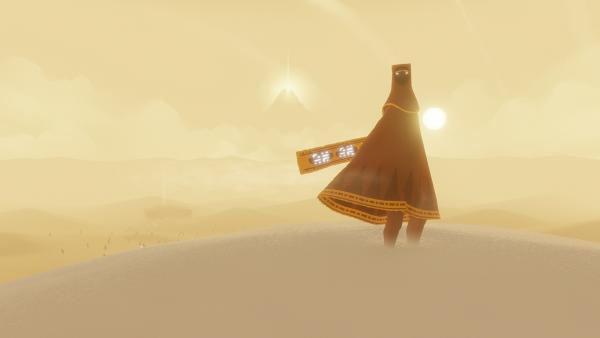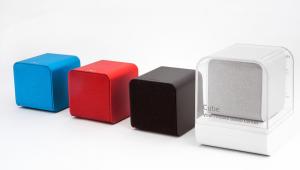Review: Journey

I’m not sure where to begin. In a Heisenbergian fashion, I can’t describe the game without ruining the game. I can’t really say what it’s about, what goes on, or really, what my feelings are after playing it.
I can only use words like “ethereal,” “haunting,” “absorbing,” even “beautiful.”
Well, maybe I can describe how I feel about it. I think. . . I loved it.
Journey, like the other minimalist/unconventional games from thatgamecompany (flOw, Flower), takes aspects of traditional games, but twists them around into a near-unrecognizable yet highly compelling experience. At the start of the game, your avatar is a red-cloaked and hooded figure in the middle of a desert. There are no instructions, other than a vague notion you should move towards objects in the distance.
As you progress, winding through gorgeously rendered environments of ancient ruins (and more), a story unfolds without language.
Along the way you meet other travelers — actual people if you’re online — as this is technically a multiplayer game. What’s fascinating is there is no way to speak to them. Your communication consists solely of a musical note, and a visual flash of symbols above your character’s head, when you press a button. In a way, you naturally develop your own language. Excited about something, you can tap rapidly, the staccato effect on screen mimicking the emotion. Walk up to someone and tap once, it’s a fairly universal way of saying “Hi!” To go with the sound and the icons above your head, a pulse of light radiates out from you when you “speak.” Among other uses that I won’t spoil, doing this near another “person” helps them fly.
A huge portion of the credit for the atmosphere of Journey has to go to Austin Wintory, whose incredible score lends big emotion to events. In a game with no dialog, and few special effects, music is critical. Wintory nailed it with a cello and string-centric orchestral score that’s lavish and sweeping. I’d buy the soundtrack, if there was one. You can check out a few tracks on his website to get an idea.
Journey is finely crafted to deliver a story and even more so, an experience, both things most games forget about entirely. Even if you stop and look around while you’re playing, it’s doubtful it will take you more than a few hours to finish. So $14.99 may seem a bit steep ( It’s available only for the PS3 on the PlayStation Network, by the way), but it’s well worth it for a unique, beautiful experience that will stay with you well after you finish playing (and doubtless, after you play it again).
Quite simply: Wow.





























































